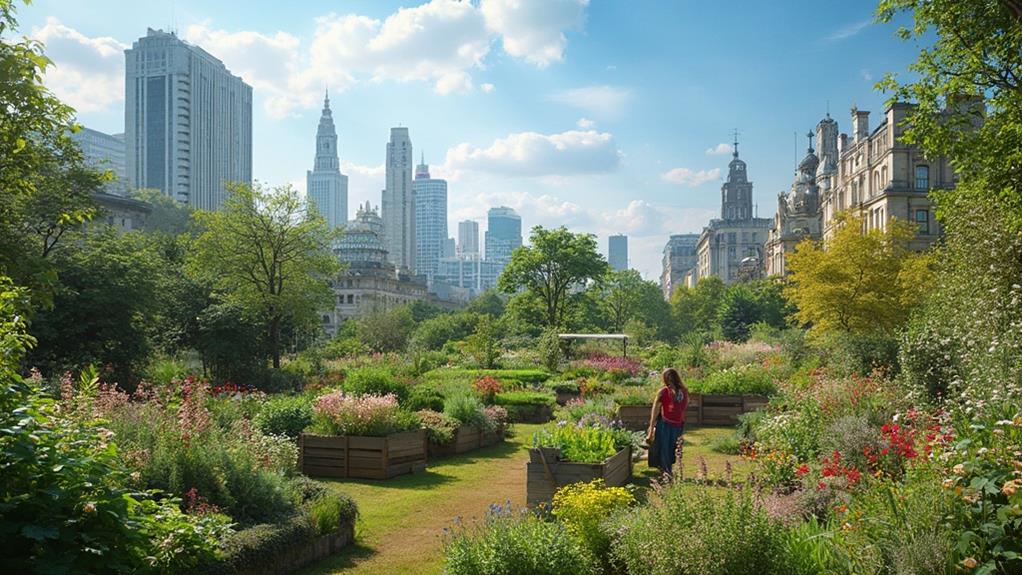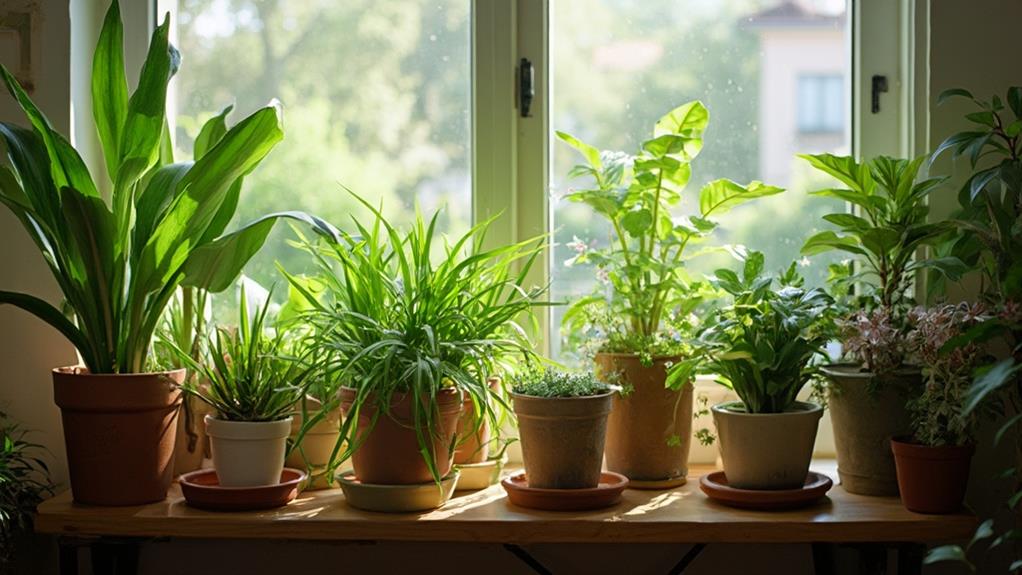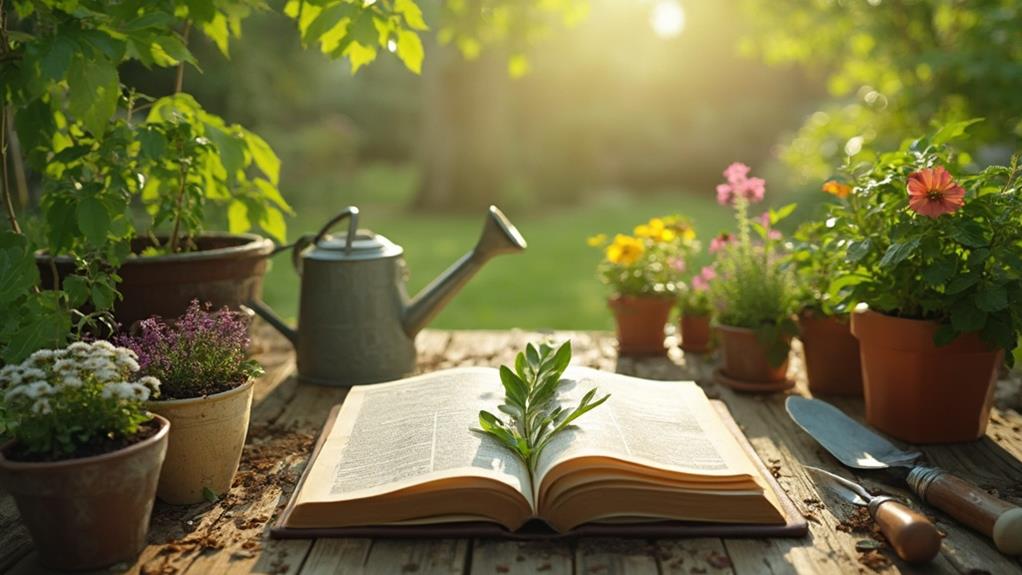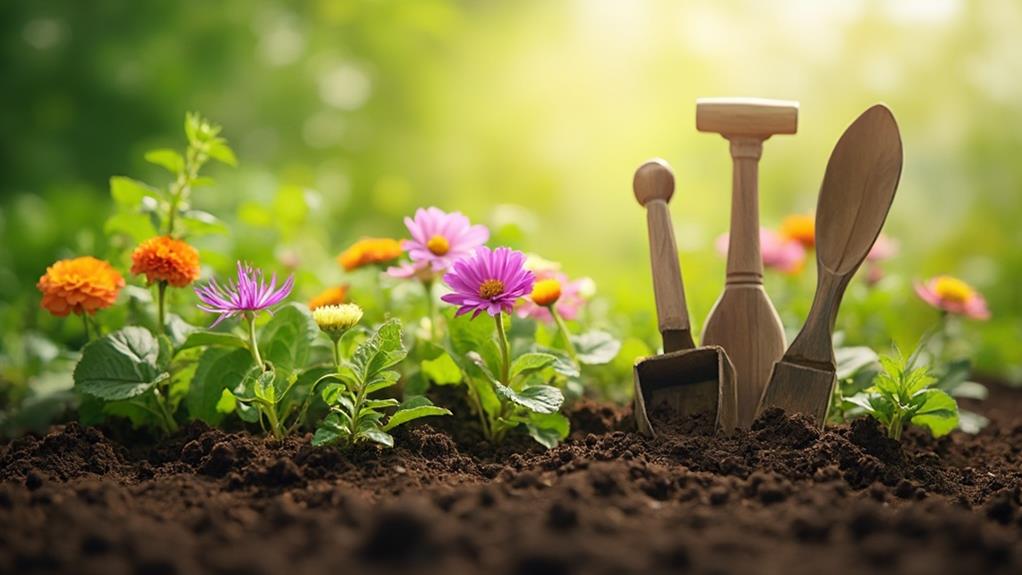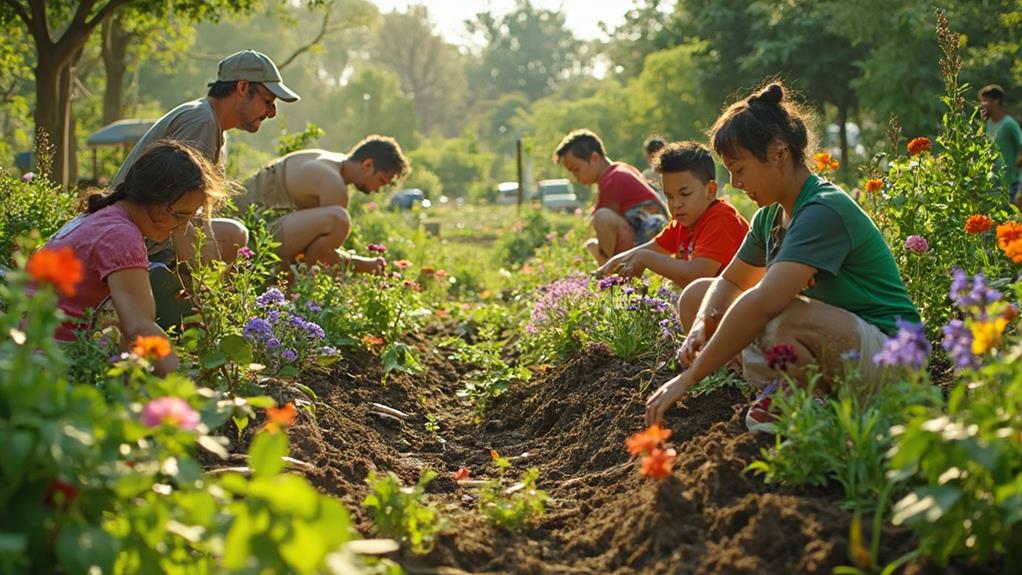If you're considering gardening lessons in London, you're looking at an opportunity to cultivate not just plants, but also a deeper connection with nature and community. You might find yourself wondering about the variety of classes available, from urban farming to sustainable practices, all designed for different skill levels. Renowned institutions offer expert guidance, ensuring you gain valuable insights. But what should you really expect from these lessons, and how can they transform your gardening approach? Let's explore what makes these experiences unique and beneficial.
Key insights
- Explore various gardening classes in London, including container gardening, urban farming, and organic gardening suitable for all skill levels.
- Participate in hands-on workshops at popular gardening schools like Capital Growth and Kew Gardens for practical learning experiences.
- Benefit from both online and in-person classes, allowing flexibility and immediate instructor access based on personal preferences.
- Learn essential plant care, soil health, and pest management techniques to enhance your gardening skills and ensure plant vitality.
- Engage in community gardening initiatives to promote biodiversity and foster connections with fellow gardening enthusiasts in your area.
Benefits of Gardening Lessons
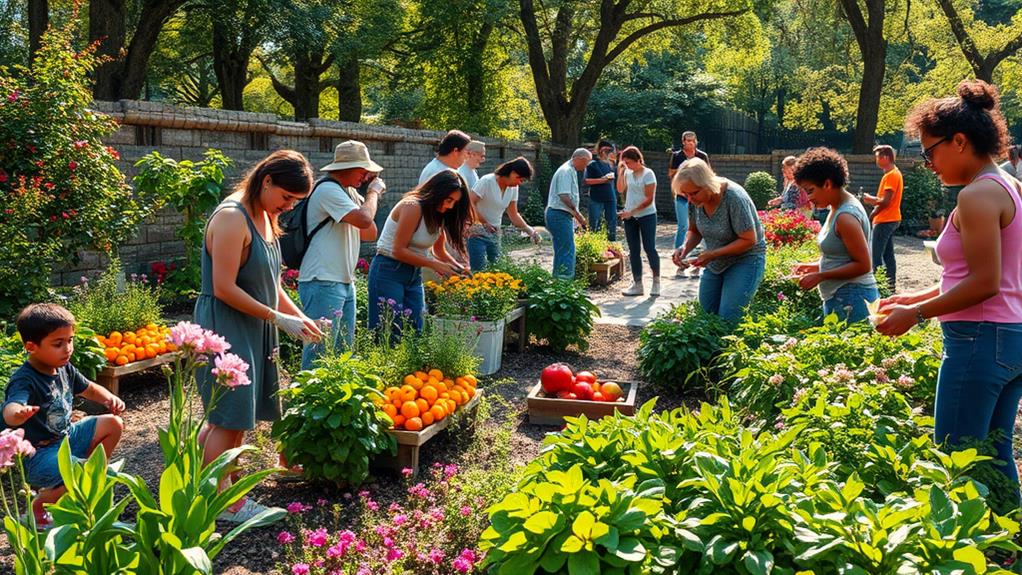
When you immerse yourself in gardening lessons, you access a world of benefits that can enrich both your life and your surroundings. One of the most significant advantages is the therapeutic benefits of gardening. Engaging with nature can reduce stress, improve your mood, and even boost your overall mental health. You'll find that spending time digging in the soil and nurturing plants can be a mindful escape from daily pressures.
Moreover, gardening lessons teach you about the environmental impact of your actions. You'll learn how to create sustainable practices that promote biodiversity and reduce waste. By understanding the importance of native plants and organic gardening methods, you can contribute positively to your local ecosystem. This knowledge not only empowers you to make informed choices but also inspires you to advocate for a greener planet.
As you cultivate your garden, you'll also cultivate a sense of community. Sharing tips and experiences with fellow gardeners fosters connections and builds friendships, making your gardening journey even more rewarding.
Types of Gardening Classes
Gardening classes come in various forms, each catering to different interests and skill levels. Whether you're a beginner or looking to expand your knowledge, there's something for everyone. You might want to explore container gardening if space is limited, or immerse yourself in urban farming for a sustainable approach to growing food in the city.
Here's a quick overview of popular types of gardening classes:
| Class Type | Focus Area | Ideal For |
|---|---|---|
| Container Gardening | Growing in small spaces | Beginners, apartment dwellers |
| Urban Farming | Sustainable practices | City dwellers, eco-conscious individuals |
| Organic Gardening | Chemical-free methods | Health enthusiasts, families |
These classes not only teach you the fundamentals but also provide hands-on experience. You'll learn about soil health, plant varieties, and the best practices for your environment. By participating, you'll gain the confidence to start your gardening journey while connecting with like-minded individuals. So, take a step towards greening your life and find a class that resonates with you!
Popular Gardening Schools in London
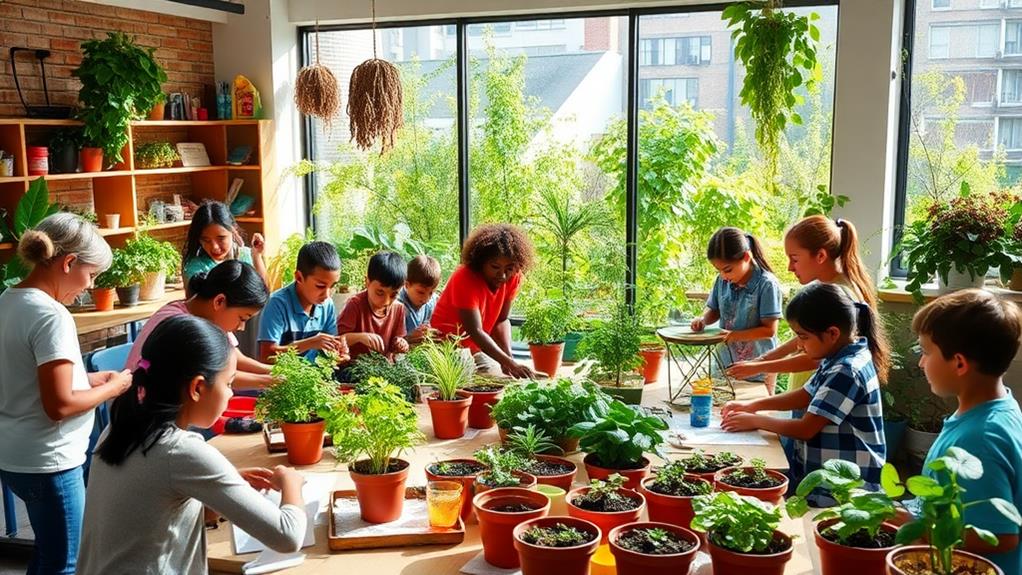
If you're keen to enhance your gardening skills, London boasts several reputable schools that cater to a variety of interests and expertise levels. You can immerse yourself in urban gardening at places like the Capital Growth, which offers hands-on horticulture workshops focusing on eco-friendly practices and crop rotation.
For those interested in the artistic side, schools such as the London College of Garden Design provide courses in botanical art and flower arranging, allowing you to express your creativity while learning the essentials.
If you want to master plant propagation or explore permaculture principles, check out the courses at the RHS Garden Wisley or the Kew Gardens, both renowned for their thorough gardening education.
Joining local gardening clubs can also enhance your learning experience. These clubs often host events and workshops that cover various topics, from garden design to sustainable practices.
You'll not only gain knowledge but also connect with fellow gardening enthusiasts. Whether you're a beginner or looking to refine your skills, London's gardening schools offer valuable resources to support your green thumb journey.
Online vs. In-Person Classes
Balancing the choice between online and in-person classes can considerably impact your gardening education. Both formats offer unique advantages, so it's crucial to weigh them against your personal preferences and lifestyle.
Online classes provide unparalleled class accessibility. You can learn from the comfort of your home, fitting lessons into your busy schedule. This flexibility often leads to higher online engagement, as you can revisit lectures or access resources at your convenience.
If you're someone who thrives in a self-paced environment, this might be the ideal choice for you.
On the other hand, in-person classes foster a hands-on experience that online formats can't replicate. You'll have immediate access to instructors, and you can engage directly with fellow gardening enthusiasts.
This face-to-face interaction can enhance your understanding of complex topics and create valuable networking opportunities.
Ultimately, your decision should hinge on what you value most in your learning experience. If you prefer flexibility and convenience, opt for online classes.
However, if you crave personal interaction and hands-on learning, in-person classes might be your best bet. Consider your goals and choose the option that aligns with your gardening aspirations.
What to Expect in a Class
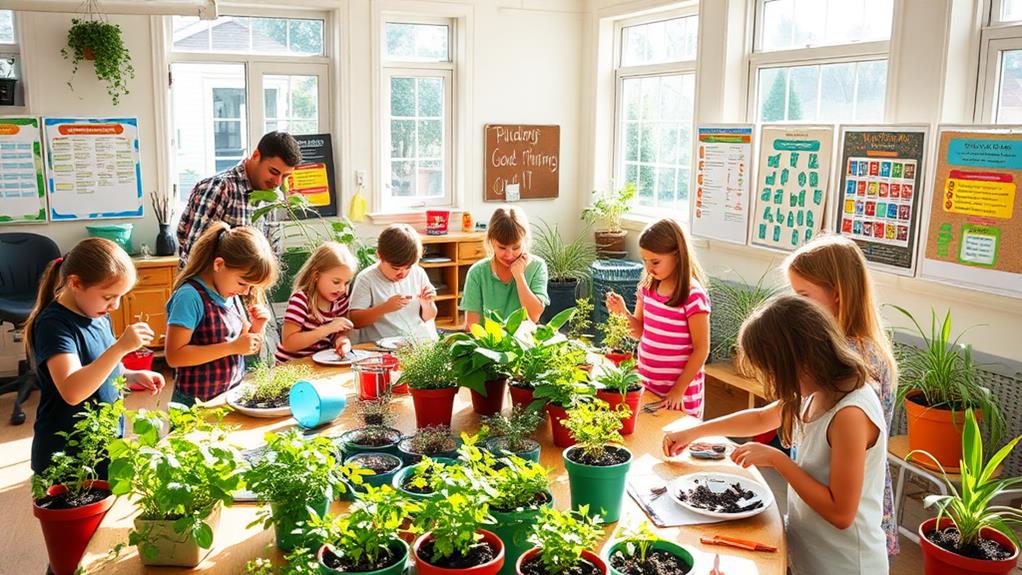
In a gardening class, you'll typically start with an overview of the class structure, so you know what to expect.
You'll learn practical techniques to enhance your gardening skills and gain a solid foundation in plant care fundamentals.
Each session is designed to equip you with hands-on experience that you can apply in your own garden.
Class Structure Overview
Expect a dynamic and interactive experience when you join a gardening class in London. These classes are designed to cater to all skill levels, whether you're a beginner or a seasoned gardener.
You'll find that class schedules are flexible, often accommodating busy lifestyles. Many institutions offer evening and weekend sessions, making it easier for you to fit gardening into your routine.
Your learning will be guided by experienced instructors who possess impressive qualifications. They often hold degrees in horticulture or related fields and have years of practical gardening experience.
This expertise guarantees you receive high-quality instruction and personalized feedback.
Classes typically combine theoretical knowledge with hands-on activities. You'll engage in discussions about plant care, pest management, and sustainable practices while also having the opportunity to get your hands dirty in a garden setting.
Expect a supportive environment where you can ask questions and share ideas with fellow gardening enthusiasts.
Learning Practical Techniques
During your gardening class, you'll dive right into practical techniques that bring theory to life.
You'll learn about soil health, understanding its importance in nurturing plants and promoting robust growth. Expect hands-on activities in pest management, where you'll discover effective methods to protect your garden without harmful chemicals.
Garden design will be a key focus, helping you visualize your space and select the right plants for your environment. You'll explore plant selection, ensuring you choose varieties that thrive in your climate and complement each other through companion planting.
The class will also cover organic gardening practices, guiding you toward sustainable methods that benefit both your garden and the planet. You'll experiment with vertical gardening and container gardening, perfect for maximizing limited space while keeping your green thumb active.
As the seasons change, you'll learn how to incorporate seasonal blooms into your designs, ensuring your garden looks vibrant year-round.
By adapting your techniques to local climate conditions, you'll cultivate a flourishing garden that reflects your personal style and commitment to sustainability.
Get ready to roll up your sleeves and dig into your gardening journey!
Plant Care Fundamentals
When you step into the Plant Care Fundamentals class, you'll uncover the essential practices that keep your plants healthy and thriving. This class focuses on two critical aspects: soil health and pest management.
You'll learn how to assess and improve soil quality, ensuring your plants have the nutrients they need to flourish. You'll plunge into topics like pH balance, organic amendments, and how to create a rich, living soil ecosystem.
In addition to soil health, you'll tackle pest management strategies that minimize damage while promoting a balanced garden environment. You'll discover how to identify common pests and understand their life cycles, allowing you to implement effective, eco-friendly control methods.
Throughout the class, you'll engage in hands-on activities, like testing soil samples and creating natural pest repellents. You'll leave with practical knowledge and skills that can be applied immediately to your own garden.
Whether you're a seasoned gardener or just starting out, this class equips you with the tools to nurture your plants and handle challenges with confidence. Join us and transform your gardening experience!
Essential Tools for Beginners
When you're starting out in gardening, having the right tools can make all the difference.
You'll want to know which must-have gardening tools to invest in, how to maintain them, and some budget-friendly options that won't break the bank.
Let's break down what you need to kickstart your gardening journey successfully.
Must-Have Gardening Tools
A well-equipped gardener can transform a patch of dirt into a flourishing oasis, and having the right tools is key to starting your journey. As a beginner, you'll want to invest in a few must-have gardening tools that make your tasks easier and more enjoyable.
First, consider ergonomic tools. These are designed to reduce strain on your hands and wrists, making them vital for long gardening sessions. A good trowel, pruning shears, and a hand fork are excellent starter options. They'll help you dig, trim, and cultivate your plants with ease.
Next, don't overlook the importance of tool storage. A sturdy garden tote or a tool belt keeps your tools organized and within reach, preventing you from wasting time searching for them. You might also want a shed or a designated space in your garage to store larger items like a shovel or rake safely.
Lastly, a watering can or hose with a spray nozzle is essential for keeping your plants hydrated. Start with these essentials, and you'll set yourself up for gardening success while enjoying every moment spent in your green space.
Tool Maintenance Tips
Maintaining your gardening tools is essential for guaranteeing they last and perform well, so don't overlook this important task.
Regular maintenance not only enhances performance but also saves you money in the long run. Here are some practical tips to keep your tools in top shape:
- Clean After Use: Always wipe down your tools after each gardening session. Remove dirt, mud, and plant residues to prevent rust and corrosion.
- Sharpen Blades: Keep your cutting tools sharp. A sharp blade makes your gardening tasks easier and safer. Use a sharpening stone or file regularly.
- Store Properly: Invest in effective tool storage solutions, like pegboards or tool racks. This keeps your tools organized and prevents them from getting damaged or misplaced.
Incorporating rust prevention techniques is also important. Applying a light coat of oil on metal parts can greatly reduce the risk of rust.
By following these tips, you'll guarantee your gardening tools remain reliable companions in your gardening journey.
Budget-Friendly Options
Taking care of your tools sets the foundation for successful gardening, but if you're just starting out, you might be wondering what you actually need without breaking the bank.
Fortunately, there are plenty of budget-friendly options that can help you kick off your gardening journey.
Start with the essentials: a trowel, pruners, and gloves. You can find these affordable supplies at local garden centers or online.
Don't hesitate to check out thrift stores or community swaps, where you can score great deals on gently used tools.
If you're feeling crafty, consider some DIY projects to create your own gardening aids. For example, a simple wooden crate can serve as a stylish planter or storage for your tools.
You can also repurpose household items like old containers for seed starters.
Lastly, join local gardening groups or online forums. They often share tips on where to find affordable supplies and can even connect you with others looking to trade tools.
With a little creativity and resourcefulness, you'll be well-equipped to cultivate your garden without straining your budget!
Community Gardening Initiatives
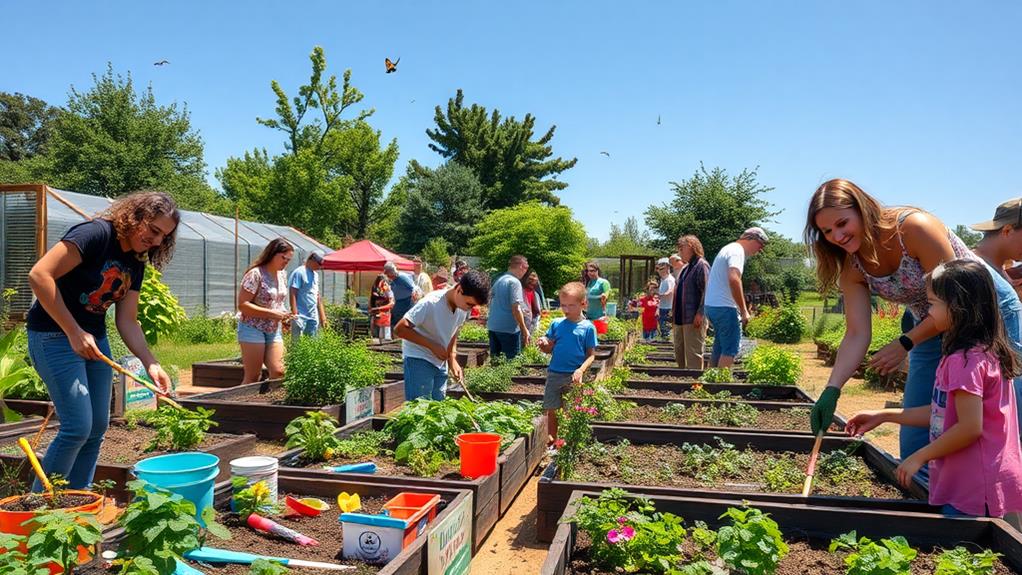
While urban living often limits access to green spaces, community gardening initiatives in London are transforming underutilized areas into vibrant hubs of biodiversity and social connection.
These projects foster community engagement, bringing neighbors together to cultivate not just plants, but also friendships. By participating, you can contribute to urban revitalization and experience the joy of seeing your neighborhood bloom.
Here are three key benefits of community gardening initiatives:
- Biodiversity Promotion: These gardens create habitats for pollinators and other wildlife, enhancing local ecosystems.
- Skill Sharing: You'll find ample opportunities to learn from fellow gardeners, whether it's about composting, planting techniques, or sustainable practices.
- Cultural Exchange: Community gardens often represent diverse cultures, allowing you to explore new plants and recipes while connecting with others.
Getting involved is easy, with many local partnerships offering volunteer opportunities for all skill levels.
Not only do you help with neighborhood beautification, but you also gain valuable experiences and friendships that enrich your life.
Seasonal Gardening Tips
As the seasons change, your gardening strategies should adapt too.
In spring, you'll want to focus on planting the right crops, while summer calls for diligent maintenance to keep your garden thriving.
Spring Planting Strategies
Spring is the perfect time to breathe life back into your garden, and a well-thought-out planting strategy can set the stage for a vibrant season ahead.
Start by improving your soil health; nutrient-rich soil is fundamental for healthy plants. You can enhance your soil by adding compost or organic fertilizers, ensuring it's well-drained and aerated.
Next, consider companion planting. This technique involves pairing plants that benefit each other, promoting growth and deterring pests. For example, planting marigolds with vegetables can help repel nematodes and other harmful insects.
Here are three effective spring planting strategies:
- Plan your layout: Map out your garden to optimize space and light. Group plants with similar needs together.
- Timing is key: Pay attention to your local frost dates. Plant tender seedlings after the last frost for the best results.
- Rotate crops: Change where you plant each type of vegetable annually to reduce pests and diseases, improving your garden's overall health.
Summer Maintenance Practices
Summer brings a unique set of challenges and opportunities for your garden, making effective maintenance practices essential. To keep your plants thriving, focus on soil health and pest management. Regularly check for signs of pests and take action promptly to protect your crops. Keep your soil healthy by mulching, watering consistently, and applying organic fertilizers.
Here's a quick reference table to aid your summer maintenance efforts:
| Task | Frequency | Tips |
|---|---|---|
| Watering | 2-3 times/week | Water early morning or late evening. |
| Pest Inspection | Weekly | Look under leaves and around roots. |
| Mulching | Monthly | Use organic materials like straw. |
| Fertilizing | Every 4-6 weeks | Choose slow-release organic options. |
Autumn Preparation Techniques
With the warm days of summer behind you, it's time to focus on preparing your garden for the autumn months. This is the perfect time to guarantee your plants remain healthy and ready for winter.
Start by conducting soil testing to understand its nutrient levels. This helps you know what amendments to add for ideal plant growth.
Next, embrace effective composting techniques. Autumn leaves make excellent compost, so gather them up and mix them with other kitchen scraps to enrich your garden soil. This not only reduces waste but also provides essential nutrients for your plants.
Here are three essential autumn preparation tips:
- Mulch your garden beds: Apply a layer of mulch to protect your plants' roots from frost and retain moisture.
- Trim perennials: Cut back dead or damaged stems to promote new growth come spring.
- Plant cover crops: These help prevent soil erosion and enrich your soil over winter.
Sustainable Gardening Practices
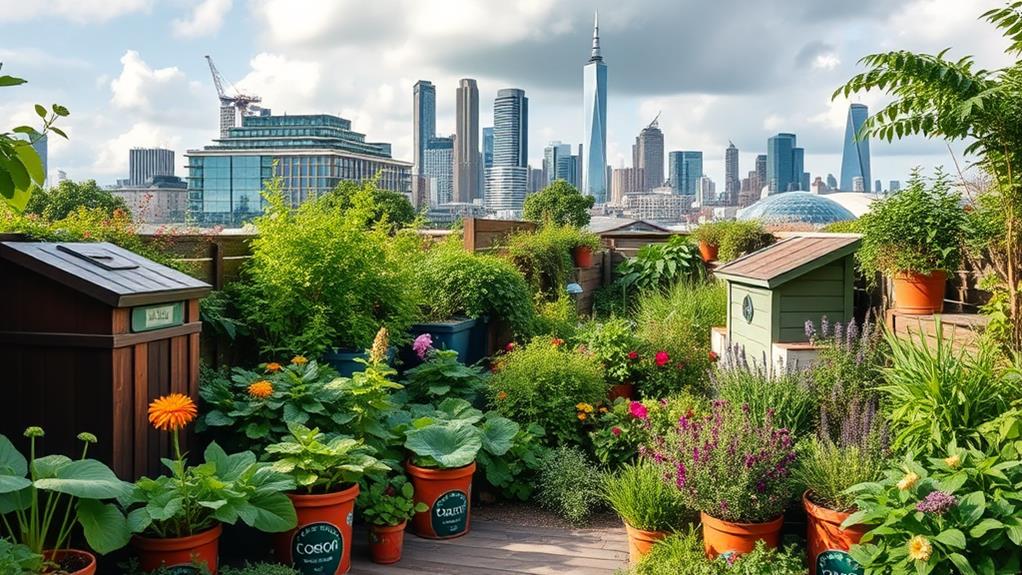
Sustainable gardening practices are essential for creating a thriving garden that benefits both you and the environment. By implementing composting techniques, you can recycle kitchen scraps and yard waste, enriching your soil health while reducing landfill contributions.
Embracing permaculture principles guarantees your garden mimics natural ecosystems, promoting biodiversity benefits and resilience against pests.
Incorporating native plants into your landscape not only supports local wildlife but also requires less water, aligning with effective water conservation strategies. Urban gardening can flourish with these practices, making even small spaces productive and eco-friendly.
Using organic fertilizers nourishes your plants without harmful chemicals, and companion planting can deter pests naturally, minimizing the need for synthetic pest management solutions.
This approach creates a balanced ecosystem in your garden, fostering healthy plant growth and reducing disease spread.
Connecting With Fellow Gardeners
Connecting with fellow gardeners enriches your gardening experience and fosters a sense of community. When you engage with others who share your passion, you not only gain knowledge but also build lasting friendships.
Joining gardening clubs is a fantastic way to connect with like-minded individuals who can offer valuable insights and advice.
Consider these ways to deepen your connections:
- Participate in Local Gardening Clubs: Find a club in your area that meets regularly. You'll discover new gardening techniques and share your own experiences.
- Host or Attend Plant Swaps: Organizing or participating in plant swaps allows you to exchange plants and seeds, encouraging diversity in your garden while making new friends.
- Join Online Gardening Forums: Engage in discussions and share photos of your garden. Online communities often have members from various regions, providing a wealth of knowledge.
These activities not only enhance your gardening skills but also create bonds that can last a lifetime.
Resources for Further Learning
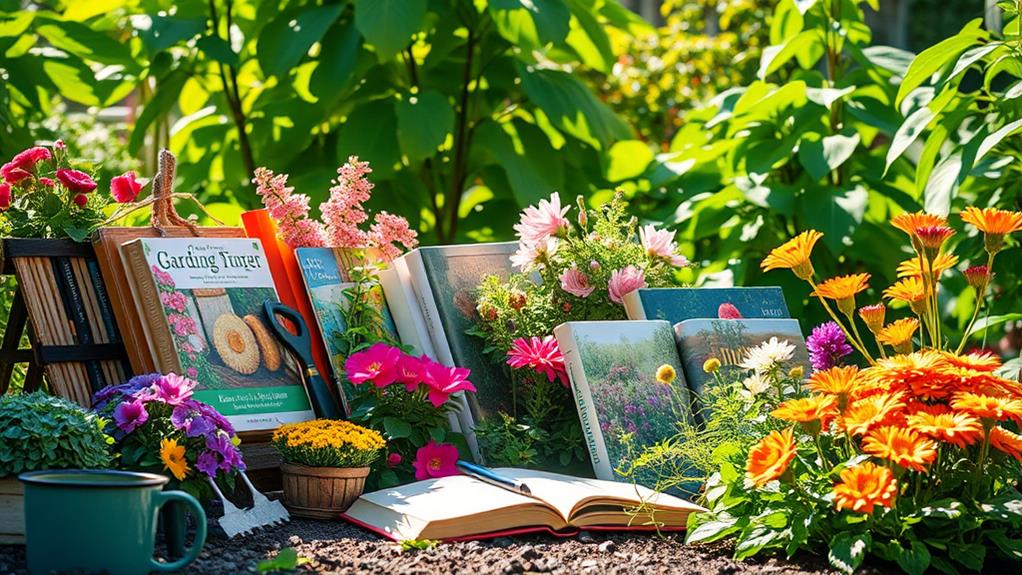
When you're looking to enhance your gardening skills, a wealth of resources is at your fingertips. Start by diving into gardening books, which offer in-depth knowledge on everything from plant identification to soil testing.
Online resources are also invaluable; websites and forums can connect you with fellow gardeners and provide tips on pest management.
Consider attending local workshops where experts share their insights and practical techniques. These hands-on experiences can be a game-changer for your gardening journey.
Don't forget to explore expert blogs; they often feature personal stories, innovative ideas, and seasonal advice that can inspire your own garden.
Video tutorials are another great tool; they visually demonstrate everything from planting techniques to troubleshooting common issues.
If you prefer listening, gardening podcasts can keep you engaged while you're on the go, offering interviews with professionals and discussions about the latest trends.
Frequently Asked Questions
What Age Groups Are Gardening Classes Suitable For?
Gardening classes are suitable for all age groups!
Whether you're a child enthusiastic to learn through youth programs or a senior looking to enjoy workshops tailored for you, there's something for everyone.
These classes not only teach practical skills but also foster a sense of community.
No matter your age, you'll find that gardening can be a fulfilling hobby that connects you with nature and others who share your passion.
Are Gardening Lessons Available in Languages Other Than English?
Yes, gardening lessons often embrace multilingual gardening, offering classes in various languages to cater to diverse communities.
You'll find opportunities to learn about cultural gardening practices while connecting with fellow enthusiasts.
Whether you're interested in Spanish, Mandarin, or another language, many instructors adapt their lessons to guarantee everyone understands.
How Often Do Gardening Classes Take Place in London?
Gardening classes occur with frequency variations throughout the year.
You'll find seasonal classes that align with planting and harvesting schedules, ensuring you learn the best techniques for each time of year.
Some classes may happen weekly, while others might be monthly or tied to specific seasons.
If you're keen to enhance your gardening skills, keep an eye out for local offerings to fit your schedule and interests.
Happy gardening!
Can I Bring My Child to Adult Gardening Classes?
In this modern age, you might wonder if you can bring your child to adult gardening classes.
Most class policies allow for child participation, but it's best to check with the specific class beforehand. Some instructors may embrace the idea, while others might prefer an adult-only environment.
Engaging your child in gardening can be a wonderful learning experience, so don't hesitate to ask about opportunities tailored for both of you!
What Should I Wear to Gardening Lessons?
When heading to gardening lessons, you should wear comfortable, weather-appropriate clothing.
Layer up if it's chilly, and don't forget a hat and sunscreen for sunny days.
For footwear, choose sturdy, appropriate footwear like boots or closed-toe shoes that can handle mud and dirt.
Remember, you'll be getting hands-on, so opt for clothes you don't mind getting dirty.
Staying practical and prepared helps you enjoy the experience without worrying about your outfit!
Summary
By embracing gardening lessons in London, you're not just cultivating plants; you're nurturing your own well-being and environmental stewardship. Much like the legendary gardens of Babylon, you can create your own oasis in the urban landscape. Whether you're digging into soil science or sharing tips with fellow enthusiasts, these classes connect you to nature and community. So, roll up your sleeves and let the earth teach you its secrets—your green thumb awaits!








